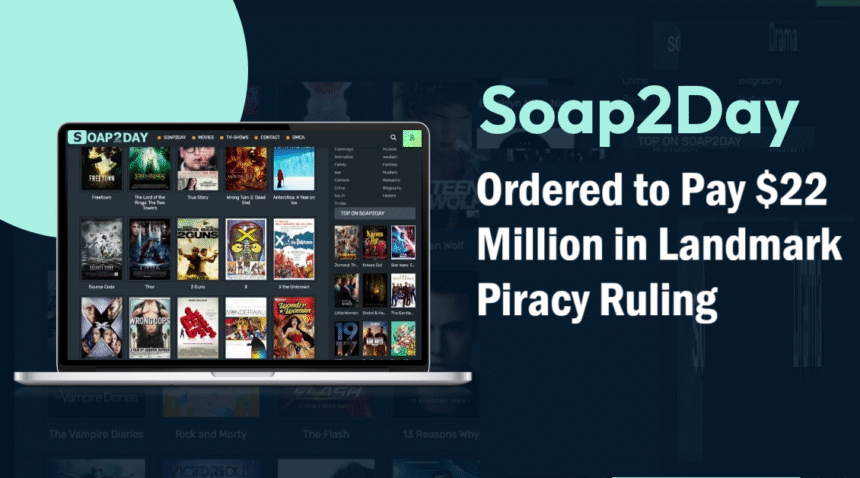OTTAWA – A Canadian Federal Court has ordered the unknown owners of Soap2day, a well-known illegal streaming platform, to pay more than $22 million in damages. Claimants include Netflix, Bell Media, Disney, Universal, and Warner Bros. Justice Simon Fothergill signed the judgment on 16 December 2024, with reasons published on 22 January 2025.
The case not only brings a new level of seriousness to online copyright enforcement in Canada but also introduces a robust order requiring Internet service providers to block access to both existing and future Soap2Day domains. Entertainment companies see the ruling as a signal that illegal streaming causes severe harm to creativity, jobs, and future content.
Soap2Day: The Persistent Challenge for Copyright Holders
Soap2Day has been popular for offering free streaming of films and TV series without any legal rights. It operated under domains like soap2day.to, soap2day.day, and soap2day.rs, drawing millions worldwide.
Films such as A Complete Unknown, Dawn of the Dead, and Muppets Most Wanted were made available without payment to license-holders. Unlike subscription services such as Netflix or Crave, Soap2Day ran on ad revenue, making its operators nearly impossible to trace. The court documents refer to them as “John Does 1 to 4”.
The legal case began in May 2023 when several large content owners took Soap2Day to court, accusing the platform of serious and ongoing copyright breaches. Soap2Day’s main domain went offline a day after legal documents were served. Yet the site’s presence did not disappear, with imitators and replicas popping up soon after.
Justice Fothergill described the battle against such platforms as a relentless “whack-a-mole” contest, with new websites opening as quickly as old ones closed. As a result, the court’s order allows content owners to update a list of blocked domains over the next two years, making Canada one of the first places to adopt this kind of ongoing site-blocking order.
Financial Penalties and Barriers to Enforcement
The damages awarded are significant. Each of the four “John Doe” operators must pay between $4.52 million and $6.08 million, with another $1 million in punitive damages and $400,000 in shared liability. Enforcement, though, is far from easy. With operators hidden and possibly outside Canada, collecting the money is likely to prove difficult. Content producers have turned to the site-blocking order as their main tool to prevent further loss from these platforms.
This decision highlights the bigger issue facing the entertainment sector: how to protect earnings and jobs when illegal platforms give away paid content for nothing. Besides Soap2Day, sites like 123movies, Popcorn Time, and The Pirate Bay have long cost studios and streaming services lost subscriptions and ad sales.
The Global Innovation Policy Center estimates that piracy drains as much as $71 billion each year from the US economy, wiping out tens of thousands of jobs. In Canada, foreign services such as Netflix capture almost all streaming viewership. Local services like Bell Media’s Crave rely on quality and exclusive content to contend.
Making TV and film can be risky and expensive. A single series such as Stranger Things costs well over $100 million per season. Blockbusters can exceed $200 million once marketing is included.
These outlays make sense only if studios can expect to earn it back, whether through tickets, streaming, or licensing. When these works are copied and shared for free, the business case for original or bold projects gets weaker. The result could be fewer ideas reaching screens and more cautious investments from studios.
The personal cost runs deep, too. The Canadian Media Producers Association says over 180,000 people work in the country’s film and TV sector. If money stops flowing, those jobs and whole local economies (like those in Vancouver and Toronto) are under threat.
Why Audiences Still Use Piracy Sites
Soap2Day’s popularity illustrates a tricky reality about internet viewing. Subscriptions can add up quickly, with content split across multiple paid platforms. Soap2Day advertised itself as a solution, promising viewers every show or film for free. This pitch is tempting for younger viewers or anyone unable to afford several streaming services. However, using illegal streaming sites carries risks.
They often host malware, scam adverts, and pop-ups that put user information and devices at risk. Also, when audiences turn to these sites, they may unknowingly help shrink the very industry they value. If producers can’t earn a profit, they may stop making new shows and films.
Canada has taken strong steps to limit piracy, starting with the 2019 GoldTV case that brought nationwide site-blocking. Since then, orders against streams of sports and now Soap2Day have given rights-holders fresh options when fighting illegal sites. The current ruling stands out by allowing claimants to keep adding new domains to the blocked list, reacting as pirates change tactics.
Stopping piracy remains tough. Investigations have shown that sites, sometimes still using the Soap2Day name, continue to stream films online. Many are hosted in places where Canadian court orders hold no weight, making eradication a slow process.
The industry is fighting back with more than court cases. Companies are calling for laws that make internet providers share responsibility for blocking access to banned sites. Technical systems, like improved rights management and digital watermarking, are being employed to discourage or trace illegal sharing. Subscription platforms are also adapting, experimenting with pricing, special offers, and exclusive programming to keep paying customers.
This case serves as a reminder about the value of supporting legal streaming services. While the lure of free content is strong, piracy harms the entire system that creates the shows and films people love.
Justice Fothergill summed it up, calling the fight against piracy a never-ending game of “whack-a-mole”. With recent court decisions and growing awareness among viewers, content creators say they are better prepared to defend their work moving forward, but they also depend on audiences making the choice to back legal content.














